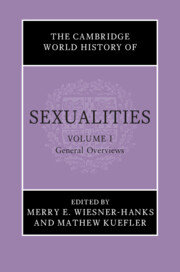Book contents
- The Cambridge World History of Sexualities
- The Cambridge World History of Sexualities
- The Cambridge World History of Sexualities
- Copyright page
- Contents
- Figures in Volume I
- Contributors to Volume I
- Editors’ Preface to the Series
- 1 The History of the History of Sexuality
- 2 The History of Sexuality and Anthropology
- 3 The History of Sexuality and Women’s History
- 4 The History of Sexuality and LGBTQ+ History
- 5 The Impact of Sigmund Freud on the History of Sexuality
- 6 Michel Foucault’s Influence on the History of Sexuality
- 7 Queer Theory and the History of Sexuality
- 8 The Sexual Body in History
- 9 Marriage and Families in the History of Sexuality
- 10 Class in the History of Sexuality
- 11 Sexuality and Race: Representations, Regulations, and Sentiments
- 12 Male Homoerotic Relations in History
- 13 Desire, Love, and Sex between Women in Global History
- 14 Trans and Gender Variant Sexualities in History
- 15 The Sale of Sex in History
- 16 Sexual Violence in History
- 17 Sexual Science in History
- 18 Sexuality and Emotion
- 19 Erotic Art in World History
- 20 Erotic Literature in History
- 21 The Material Culture of the History of Sexuality
- 22 Public History and Sexuality
- Index
- CONTENTS TO VOLUMES II, III, AND IV
- References
16 - Sexual Violence in History
Published online by Cambridge University Press: 26 April 2024
- The Cambridge World History of Sexualities
- The Cambridge World History of Sexualities
- The Cambridge World History of Sexualities
- Copyright page
- Contents
- Figures in Volume I
- Contributors to Volume I
- Editors’ Preface to the Series
- 1 The History of the History of Sexuality
- 2 The History of Sexuality and Anthropology
- 3 The History of Sexuality and Women’s History
- 4 The History of Sexuality and LGBTQ+ History
- 5 The Impact of Sigmund Freud on the History of Sexuality
- 6 Michel Foucault’s Influence on the History of Sexuality
- 7 Queer Theory and the History of Sexuality
- 8 The Sexual Body in History
- 9 Marriage and Families in the History of Sexuality
- 10 Class in the History of Sexuality
- 11 Sexuality and Race: Representations, Regulations, and Sentiments
- 12 Male Homoerotic Relations in History
- 13 Desire, Love, and Sex between Women in Global History
- 14 Trans and Gender Variant Sexualities in History
- 15 The Sale of Sex in History
- 16 Sexual Violence in History
- 17 Sexual Science in History
- 18 Sexuality and Emotion
- 19 Erotic Art in World History
- 20 Erotic Literature in History
- 21 The Material Culture of the History of Sexuality
- 22 Public History and Sexuality
- Index
- CONTENTS TO VOLUMES II, III, AND IV
- References
Summary
This chapter charts sexual violence over time and place, showing substantial shifts in thinking about sex as violence, rape as an assault on property, emerging ideas of consent, and changing attitudes towards the victim and the offender. It traces how sexual violence was defined and understood, in both society and law, from the classical world to today, examining case studies that include rape, sodomy and offences against children. It examines the structural impediments to the prevention of sexual violence, and the social and legal barriers to justice when a crime did occur. It highlights the fact that responses to sexual violence vary between individuals and communities, though survivors reveal that many forms of sex might be experienced as violent or traumatic, regardless of whether the acts were normalised or criminalised. Ideas of sexual violence are read through intersectional lenses, highlighting the idea that normative ideas of gender, sexual identity, race and class heightened the potential for sexual exploitation of marginalised groups. Limited, fragmented or unrepresentative sources make it challenging to trace sexual violence in history, but it is imperative to do so, as sexual crimes have had a substantial impact on the life experiences of individuals and their families and communities.
- Type
- Chapter
- Information
- The Cambridge World History of Sexualities , pp. 339 - 361Publisher: Cambridge University PressPrint publication year: 2024

